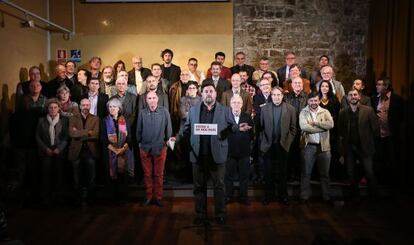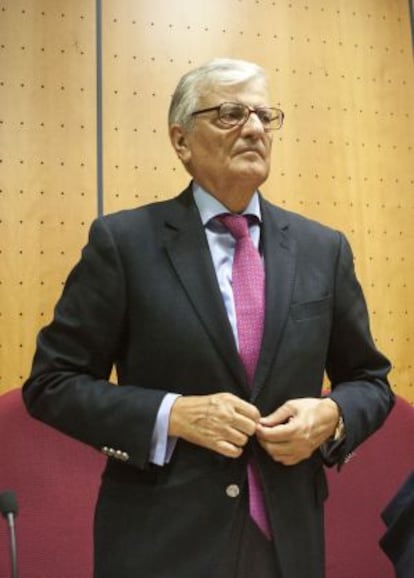Catalan leader sets one-month deadline to decide on early elections
Deputy PM: government will respect Attorney General’s decision on self-rule vote complaint

The Catalan government will decide before the year is out whether to hold early elections in the region in the wake of the November 9 unofficial vote on self-rule.
Regional premier Artur Mas has said that if the central government refuses to discuss the possibility of a new, binding referendum on independence, then he may call elections that would act as a plebiscite to measure popular support for his independence drive.
“It’s not about spending our days wavering over what to do, it’s about spending the minimum necessary time, around a month,” said Catalan government spokesman Francesc Homs in statements to regional radio station RAC1. “Before the end of the year we need to know whether we are moving this way or that.”
Mas, of the moderately nationalist CiU bloc, on Thursday met with representatives of other pro-independence parties, as well as the Catalan Socialists (PSC), to see whether they might form a grand coalition to run in these hypothetical early elections together.
But the talks underscored the lack of agreement. “It is evident that the PSC’s project is different from CiU’s, and that ERC’s [the Catalan Republican Left] is different from the ICV’s [Initiative for Catalonia Greens], but there is a desire to find solutions,” said Homs.
The spokesman added that Mas would also contact representatives of civil society, social agents and business associations.
Regarding the possibility that state prosecutors might bring a complaint against Mas and some of his aides for organizing the November 9 vote despite a Constitutional Court freeze on it, Homs said Catalan officials were “completely calm.”
He also suggested that investigators should look into allegations that the Popular Party (PP) used its position in government to try to pressure the Attorney General’s Office into starting legal proceedings against Mas over the ballot.
“In a normal country, this type of statement and political pressure would require a very in-depth investigation,” said Homs. “What leaders and elected officials of the PP did is deplorable and should be investigated.”
The head of the Catalan branch of the PP, Alicia Sánchez-Camacho, said on a television program shortly after the ballot was held that Mas would soon be slapped with a formal complaint by the Attorney General’s Office, and even detailed the crimes of which he would be accused.

The statement sparked concerns about the impartiality of state prosecutors, who earlier this week complained that the government had been interfering with their work in order to speed up action against the instigators of the poll.
Although legal sources confirmed at the time that a complaint was being readied, the decision is now being postponed as the government and state prosecutors wrangle over who should be charged, what to charge them with, and above all who should do the charging.
On Friday, Deputy Prime Minister Soraya Sáenz de Santamaría made a point of noting that the government would respect the Attorney General’s Office’s decisions on the matter, “since it is an autonomous agency.”
Meanwhile, Attorney General Eduardo Torres-Dulce sought to take pressure off himself by issuing a reminder that, as well as the Catalan Attorney General, the Catalonia regional High Court was also dealing with the matter.
“What we have to decide is whether we need to file a complaint, if we deem it proper procedure,” he said in the northern Spanish city of Burgos on Friday. “We will do so when we feel that we have all the elements to consider the complaint.”
Tu suscripción se está usando en otro dispositivo
¿Quieres añadir otro usuario a tu suscripción?
Si continúas leyendo en este dispositivo, no se podrá leer en el otro.
FlechaTu suscripción se está usando en otro dispositivo y solo puedes acceder a EL PAÍS desde un dispositivo a la vez.
Si quieres compartir tu cuenta, cambia tu suscripción a la modalidad Premium, así podrás añadir otro usuario. Cada uno accederá con su propia cuenta de email, lo que os permitirá personalizar vuestra experiencia en EL PAÍS.
¿Tienes una suscripción de empresa? Accede aquí para contratar más cuentas.
En el caso de no saber quién está usando tu cuenta, te recomendamos cambiar tu contraseña aquí.
Si decides continuar compartiendo tu cuenta, este mensaje se mostrará en tu dispositivo y en el de la otra persona que está usando tu cuenta de forma indefinida, afectando a tu experiencia de lectura. Puedes consultar aquí los términos y condiciones de la suscripción digital.








































